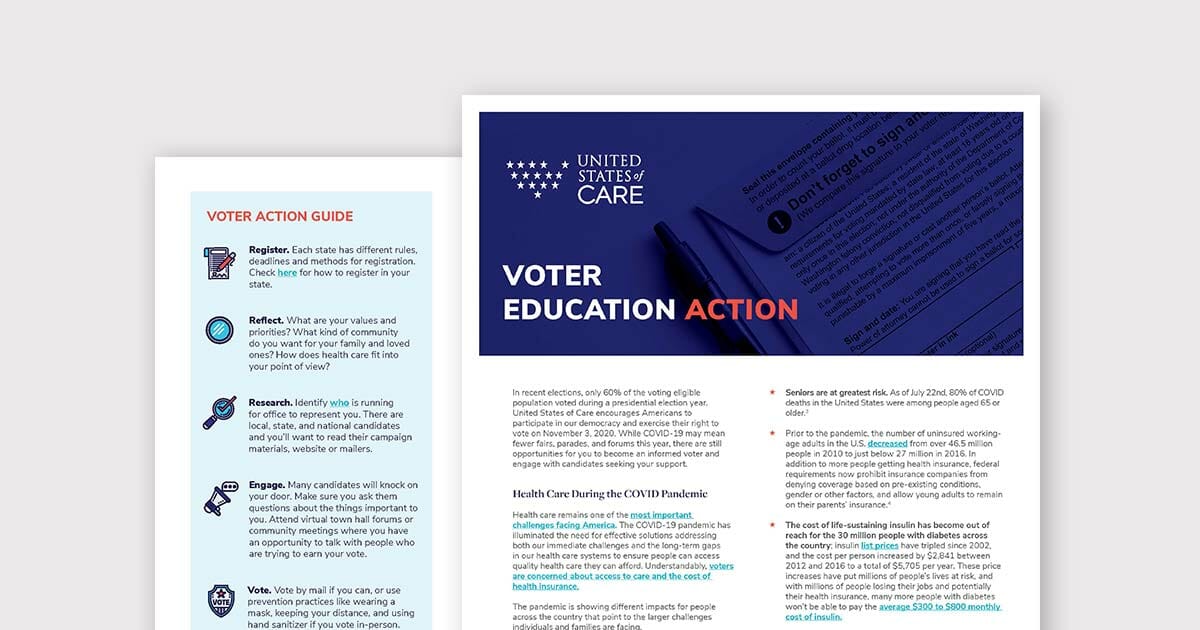Resources
2020 Voter Action Guide

In recent elections, only 60% of the voting eligible population voted during a presidential election year. United States of Care encourages Americans to participate in our democracy and exercise their right to vote on November 3, 2020. While COVID-19 may mean fewer fairs, parades, and forums this year, there are still opportunities for you to become an informed voter and engage with candidates seeking your support.
Health Care During the COVID Pandemic
Health care remains one of the most important challenges facing America. The COVID-19 pandemic has illuminated the need for effective solutions addressing both our immediate challenges and the long-term gaps in our health care systems to ensure people can access quality health care they can afford. Understandably, voters are concerned about access to care and the cost of health insurance.
The pandemic is showing different impacts for people across the country that point to the larger challenges individuals and families are facing.
- The economic fallout of the pandemic has jeopardized access to insurance. Nearly 27 million Americans have lost health insurance for their job. An estimated 12.7 million would be eligible for Medicaid, our insurance safety-net; 8.4 million could qualify for subsidies on insurance marketplaces; leaving 5.7 million who would need to cover the cost of health insurance policies on their own and remain uninsured.
- Access to health care in rural areas has only become more challenging during the pandemic and will likely have lasting impacts on rural communities.
- Seniors are at greatest risk. As of July 22nd, 80% of COVID deaths in the United States were among people aged 65 and older.
- Prior to the pandemic, the number of uninsured working-age adults in the U.S. decreased from over 46.5 million people in 2010 to just below 27 million in 2016. In addition to more people getting health insurance, federal requirements now prohibit insurance companies from denying coverage based on pre-existing conditions, gender or other factors, and allow young adults to remain on their parents’ insurance.
- The cost of life-sustaining insulin has become out of reach for the 30 million people with diabetes across the country; insulin list prices have tripled since 2002, and the cost per person increased by $2,841 between 2012 and 2016 to a total of $5,705 per year. These price increases have put millions of people’s lives at risk, and with millions of people losing their jobs and potentially their health insurance, many more people with diabetes won’t be able to pay the average $300 to $800 monthly cost of insulin.
- A disproportionate number of those infected by COVID-19 are Black, Indigenous, and people of color. According to recent CDC data, 31.4% of cases and 17% of deaths are among Latino residents and 19.9% of cases and 22.4% of deaths were among Black residents. They make up 18.5% and 13.4% of the total population respectively.
With new questions surrounding the future of the Affordable Care Act due to a pending case before the U.S. Supreme Court, and in the wake of COVID-19, people running for elected office should find solutions that meet both our short- and long-term health care needs.
Voter Action Guide
Register. Each state has different rules, deadlines and methods for registration. Check here for how to register in your state.
Reflect. What are your values and priorities? What kind of community do you want for your family and loved ones? How does health care fit into your point of view?
Research. Identify who is running for office to represent you. There are local, state and national candidates and you’ll want to read their campaign materials, website and mailers.
Engage. Many candidates will knock on your door. Make sure you ask them questions about the things important to you. Attend virtual town hall forums or community meetings where you have an opportunity to talk with people who are trying to earn your vote.
Vote. Vote by mail if you can, or use prevention practices like wearing a mask, keeping your distance, and using hand sanitizer if you vote in-person. Check here to see if vote-by-mail is available in your state.
Questions to Ask Candidates
- How will your initiatives make it easier for people to feel secure, free to make decisions, and that they have dependable health care coverage regardless of life changes?
- Both now and after the pandemic, what would you do to create a health care system that is reliable, fully resources, and available whenever it is needed?
- What efforts will you take to improve our health care system to care for everyone, including people who are vulnerable and those who were already struggling before the pandemic hit?
- What will you do to assure we are prepared for future surges of the pandemic?
- How will you ensure people can provide for themselves and their loved ones, especially considering the financial impact of the pandemic?
Watch October 6 Live Stream – EMPOWERING VOTERS: How to Talk to Candidates About Health Care
For more information or to seek assistance, contact USofCare at Help@USofCare.org.